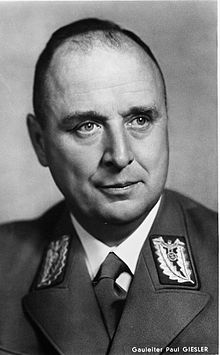Paul Giesler
| Paul Giesler | |
|---|---|
 |
|
| Minister President of Bavaria | |
|
In office 2 November 1942 – 28 April 1945 |
|
| Preceded by | Ludwig Siebert |
| Succeeded by | Fritz Schäffer |
| Reich Minister of the Interior | |
|
In office 29 April 1945 – 6 May 1945 |
|
| Appointed by | Adolf Hitler |
| President |
Adolf Hitler (Führer) Karl Dönitz |
| Chancellor |
Adolf Hitler Joseph Goebbels Lutz Graf Schwerin von Krosigk (Leading Minister) |
| Preceded by | Heinrich Himmler |
| Succeeded by | Wilhelm Stuckart |
| Personal details | |
| Born |
15 June 1895 Siegen, Westphalia |
| Died | 8 May 1945 (aged 49) Berchtesgaden |
| Nationality | German |
| Political party | Nationalsozialistische Deutsche Arbeiter Partei |
| Religion | Lutheranism |
Paul Giesler (15 June 1895 – 8 May 1945) was a member of the Nazi Party, from 1941 Gauleiter of Westphalia-South (Westfalen-Süd) and as of 1942 also acting Gauleiter of the Gau Munich-Upper Bavaria (Gau München-Oberbayern). He was from 2 November 1942 to 28 April 1945 the Premier (Ministerpräsident) of Bavaria.
The trained architect was from 1924 a Party speaker, an SA leader, and NSDAP district leader (Ortsgruppenleiter). During the Night of the Long Knives he only narrowly missed being arrested and murdered. He served in the Poland and France campaigns. Only from August 1941 did Giesler once again take up important Party functions, at Martin Bormann's instigation, first becoming NSDAP Gauleiter of Westphalia-South in 1941, and then as of April 1942 Adolf Wagner's successor as acting Gauleiter of Munich-Upper Bavaria. After Ludwig Siebert's death on 1 November 1942, he was also appointed acting Ministerpräsident of Bavaria. As the war continued, he took up more and more ministerial posts, especially after Wagner's death.
In Munich, Giesler was known for speaking out against higher education for women, provoking student walk-outs of his speeches. He was also known for the capture and defeat of the White Rose (Weiße Rose) student resistance movement. In April 1945, he was appointed Reich Defence Commissar-South and with help from SS units brutally quelled the "Freedom Action Bavaria" ("Freiheitsaktion Bayern") uprising under Captain Dr. Rupprecht Gerngroß in Munich. Reflecting Giesler's fanatically loyal Nazi outlook he was named Reich Minister for the Interior in Adolf Hitler's will of 29 April 1945, though he never had the chance to assume this post.
...
Wikipedia
